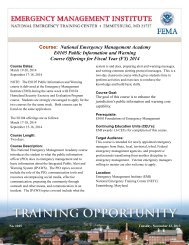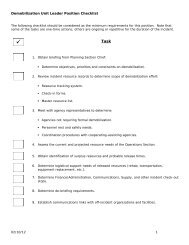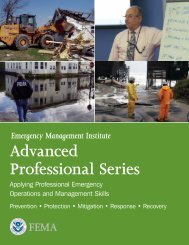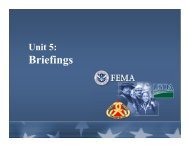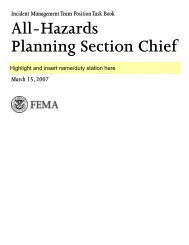Reputation and Federal Emergency Preparedness Agencies, 1948
Reputation and Federal Emergency Preparedness Agencies, 1948
Reputation and Federal Emergency Preparedness Agencies, 1948
Create successful ePaper yourself
Turn your PDF publications into a flip-book with our unique Google optimized e-Paper software.
Addressing natural disasters provided more political rewards than addressing other<br />
disasters. These disasters were more frequent, <strong>and</strong> FEMA could claim credit for successful<br />
recovery, while hazardous materials accidents, oil spills, <strong>and</strong> terrorist attacks were under the<br />
jurisdiction of several agencies which FEMA had trouble competing with, as Giuffrida’s tenure<br />
showed. In addition to having more jurisdiction over natural disasters than over others, FEMA<br />
was wise to focus on disasters which have a degree of predictability: natural disasters follow<br />
patterns which responders can observe to improve response over time. Most importantly, the<br />
agency shifted resources toward problems, such as flood control, that could be ameliorated,<br />
unlike civil defense preparation for a protean enemy.<br />
The agency’s reputation, built by both the knowledge accumulated by a professional<br />
culture <strong>and</strong> a bureaucratic entrepreneur who installed connections to political actors, is the<br />
foundation of its bureaucratic power. But the all hazards mission is the agency’s cognitive frame;<br />
it structures the organization of its tasks in the minds of emergency managers. During the 1990s,<br />
FEMA’s leadership used this frame to steer the agency toward more <strong>and</strong> better mitigation <strong>and</strong><br />
response to natural disasters in the form of expertise <strong>and</strong>, most importantly, money. The<br />
improved response to natural disasters provided political rewards that equivalent effort spent on<br />
addressing the complicated issues involved in hazardous materials accidents, for example, would<br />
not.<br />
The durability of the all hazards concept, <strong>and</strong> with it FEMA’s ability to focus on natural<br />
disasters rather than be a national security agency, has been tested in the homel<strong>and</strong> security<br />
environment. There are reasons to believe that terrorism is incompatible with the definition of all<br />
hazards that existed before September 11. Terrorism lacks predictability <strong>and</strong> clear definitions:<br />
the enemy is elusive <strong>and</strong> it is unclear who or what should be involved in prevention <strong>and</strong><br />
response. Weapons could be biological, radiological, chemical, or traditional arms, <strong>and</strong> the<br />
medical <strong>and</strong> damage control elements of response overlap with law enforcement <strong>and</strong><br />
investigative elements. While natural disasters easily fit the all hazards idea, it is not clear how<br />
vague concepts like terrorism or homel<strong>and</strong> security would satisfy the need for a single clear<br />
mission <strong>and</strong> well defined core tasks. During the early 1990s, Witt may have been wise to steer<br />
clear of involvement with new national security obligations in order to make FEMA more<br />
effective at meeting the expectations of politicians <strong>and</strong> the public. The all hazards idea was a<br />
way for FEMA to protect funding <strong>and</strong> staffing for emergency management’s traditional mission<br />
of preparation, response <strong>and</strong> recovery to natural <strong>and</strong> technical disasters from overcompensation<br />
for whatever the newest low probability threat might be. In 1999, it was Y2K, <strong>and</strong> after<br />
September 11 it has been terrorism. If FEMA’s leaders provide too much accommodation for<br />
terrorism in the all hazards approach, the success the agency has enjoyed since Witt’s<br />
reorganization may be in jeopardy. Without future domestic terrorism, public support for<br />
counterterrorism <strong>and</strong> homel<strong>and</strong> security in general could wane just as it did when faced with the<br />
diminishing salience of the threat of nuclear war during the Cold War.<br />
FEMA’s reputation has suffered since September 11, at the very least because it is buried<br />
in the Department of Homel<strong>and</strong> Security <strong>and</strong> because it lacks the resources to respond to both<br />
traditional threats of natural disasters <strong>and</strong> the new terrorist threats. Its core mission of responding<br />
to all hazards, however, could undergo a rebirth. The agency is forced to use its resources more<br />
efficiently because it must also respond to the extraordinary dem<strong>and</strong>s of terrorism preparation<br />
<strong>and</strong> because Republican administrations generally issue fewer disaster declarations. The effort to<br />
craft a new National Response Plan signals the next stage in the development of the all hazards<br />
concept. The plan is no longer just federal, but instead is national, <strong>and</strong> it includes state <strong>and</strong> local<br />
<strong>Reputation</strong> <strong>and</strong> <strong>Federal</strong> <strong>Emergency</strong> <strong>Preparedness</strong> <strong>Agencies</strong>, <strong>1948</strong>-2003 29



